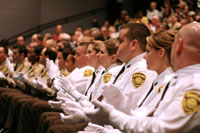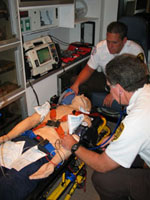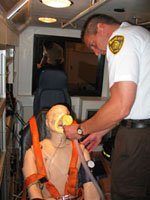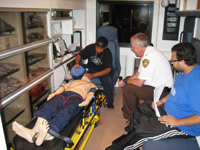Research, Training, and Quality Improvement
The Research, Training, and Quality Improvement (RTQI) team is responsible for the training and continuing education of Boston EMS’ EMTs and Paramedics. Through its quality assurance program, RTQI is also responsible for ensuring that Boston EMS consistently delivers superior care to the people of Boston. Furthermore, RTQI conducts critical research designed to introduce new treatment protocols and technologies with the goal of advancing pre-hospital emergency medical care. Under the leadership of Sophia Dyer, MD, the RTQI team includes Associate Medical Directors Lori L. Harrington, MD and Ricky C. Kue, MD, Emergency Medicine Fellows, Deputy Superintendents, Training Captains, an ALS Clinical Coordinator, Paramedics, administrative staff and research professionals. The members of RTQI are creative and forward thinking and their research contributions have encouraged positive change and progress in the field of pre-hospital emergency medicine.
Training

Through its incredibly robust training programs, the Training Division within RTQI has positioned Boston EMS as a leader in quality EMS education. The Training Division is responsible for the initial and ongoing training and professional development of Boston EMS EMTs and Paramedics. Through its accredited Training Academy, the Division operates an extremely intensive 6-month course designed to prepare new recruits for the challenges of delivering pre-hospital emergency medicine. The course, taught by training personnel with extensive field experience, includes classroom work, rigorous field instruction, exercises, and drills. Similarly, the Training Division operates an extensive internship program for Boston EMS EMTS interested in becoming Paramedics. The training program prepares future Paramedics to deliver complex medical interventions in the field. The Training Division also offers a low-cost Basic EMT Course that prepares aspiring EMTs for a career in the field of pre-hospital emergency medicine.
Learn More about the Training Division »
Research, Innovation, & Quality Improvement
In order to advance pre-hospital emergency medicine and provide patients with innovate care, Boston EMS’ RTQI team conducts ground-breaking research and operates a comprehensive quality assurance program. The team is currently researching best practices in cardiac resuscitation, the effectiveness of alternative intravenous access devices, and the impact of new breathing equipment, among other things.
RTQI also conducts systematic evaluations of patient care reports to assess treatment protocols and ensure compliance with standard operating procedures. During monthly training sessions, RTQI reviews the most challenging as well as the most common medical cases with field personnel to ensure that Boston EMS EMTs and Paramedics are delivering superior care. Examples of recent research projects as well as clinical and training innovations are described below.
Cardiac Arrest Review
Since 1996, RTQI has been reviewing all cardiac arrests that occur in the City of Boston. In order to identify ways to improve patient care, RTQI evaluates each incident individually and enters case information into an internal cardiac registry. Additionally, RTQI downloads and assesses pre-hospital electrocardiographic information. Such thorough and comprehensive data collection allows RTQI to conduct in-depth research with the goal of identifying new methods to enhance clinical care. In 2008, Boston EMS began contributing data to the CARES (Cardiac Arrest Registry to Enhance Survival) cardiac arrest registry, managed out of Emory University by Dr. Brian McNally, MD, a former Boston EMS Physician Fellow.
Therapeutic Hypothermia

Sudden cardiac arrest is the leading cause of death in the United States. Statistics show that a significant number of individuals who survive sudden cardiac arrest often suffer from residual brain injuries. Therapeutic Hypothermia, the process of cooling the body and maintaining mild hypothermia (32-34°C) in the first 12 - 24 hours after the arrest, helps to protect brain function and can improve survival and neurological outcomes. Boston EMS Paramedics have the training and skills necessary to initiate this treatment in the field using ice packs and cooled saline. The Boston EMS physician group conducts systematic reviews of all cases in which Therapeutic Hypothermia has been applied. In June 2008, Boston EMS became one of the early adopters of this therapy in the pre-hospital arena, bringing innovative care to the streets of Boston.
Continuous Positive Airway Pressure

A non-invasive procedure that forces oxygen into the lungs, Continuous Positive Airway Pressure (CPAP) is a therapy applied to patients in severe respiratory distress. Typically CPAP was only used in the hospital setting, but in April 2007 Boston EMS Paramedics began administering the treatment in the field. CPAP often reduces the need for intubation and minimizes complications, resulting in shorter hospital stays.
Boston Airway Registry
Boston EMS Paramedics are trained to administer endotracheal intubations, by which a tube is inserted through a patient’s mouth into the trachea allowing high concentration oxygen to be delivered to the lungs. Boston EMS has demonstrated an incredibly high intubation success rate, which is a testament to the advanced airway management skills of the Department’s Paramedics. As part of its comprehensive quality assurance program, RTQI created the Boston Airway Registry in July 2006. Any incident in which an endotracheal intubation is performed is evaluated by a team of Boston EMS physicians to ensure quality of care. A review of cases from July 2006 through June 2007 demonstrated that Boston EMS’ intubation success rate is comparable to rates achieved in the Emergency Department setting.
Simulation Lab

In 2008, Boston EMS built a state-of-the-art Simulation Lab or “Sim Lab,” which provides a space for EMTs and Paramedics to effectively prepare for real-life scenarios. The facility features a living room, a fully equipped mock ambulance, as well as high-fidelity mannequins complete with realistic anatomy. The facility also includes a control room that monitors and records training sessions, providing EMTs and Paramedics with the opportunity to review and evaluate their performance.



